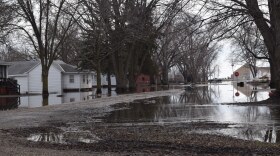The U.S. Army Corps of Engineers is predicting more than 38 million acre feet of runoff will go into the upper Missouri River Basin this year, which will be the 6th highest on record in the last 120 years, if reached.
Kevin Grode with the corps of engineers told people at a public meeting in Sioux City on Wednesday that the basin’s soil conditions are very wet in Iowa.
“If you have a garden, if you have a field, if you have extremely wet soils, most of the rain that falls is going to become runoff, it’s not going to soak into the ground,” Grode said. “And so, then that just makes the runoff running into the rivers is going to be more.
The corps of engineers says 11 million acre feet of runoff -- water from rains and snowmelt that wasn't absorbed by the ground -- went into the upper Missouri River Basin last month. It’s the largest amount of monthly runoff since they started keeping track 120 years ago.
On average, the annual upper basin runoff is just above 25 million acre feet, Grode said. The total in 2018 reached 42 million acre feet, more than 150 percent above average and the third highest upper basin runoff in the 120-year period.
Kevin Low, a weather service hydrologist with the Missouri River Basin Forecast Center, addressed the March flood event and said flooding is far from over. Mountain snowpack is at an average amount for the year, so he said the service is not anticipating any significant flooding from snow melt from the mountains in northern states, but plain soils are wet, which means a part of the river basin is at risk of more flooding.
“It looks like Mother Nature is going to give us the forcings for that, the input for that,” Low said. “So the eastern portion of the basin does remain at an enhanced risk of flooding for the next 90 days.”
Both the National Weather Service and the corps say there is a higher risk of flooding these next few months.






